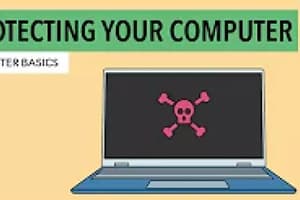Podcast
Questions and Answers
What is destructive software commonly referred to as?
What is destructive software commonly referred to as?
- Hardware
- Productivity tools
- Antivirus software
- Malware (correct)
Which of the following is an example of ransomware?
Which of the following is an example of ransomware?
- Software that monitors your keystrokes
- Software that locks your files and demands payment (correct)
- Software that displays targeted ads
- Software that spreads through USB devices
What is the primary purpose of antivirus software?
What is the primary purpose of antivirus software?
- Encrypting files
- Optimizing the computer's speed
- Preventing unauthorized access to the computer
- Detecting and removing malware (correct)
What is a key characteristic of phishing emails?
What is a key characteristic of phishing emails?
What does a spam filter do?
What does a spam filter do?
Which of the following is NOT a type of malware?
Which of the following is NOT a type of malware?
What is the first step to take if antivirus software detects malware?
What is the first step to take if antivirus software detects malware?
Why is it important to update antivirus software regularly?
Why is it important to update antivirus software regularly?
Flashcards
Malware
Malware
Destructive software designed to damage or disrupt computer systems.
Ransomware
Ransomware
Malware that locks your files and demands payment for their release.
Antivirus software
Antivirus software
Software that detects, prevents and removes malware.
Phishing emails
Phishing emails
Emails that trick users into revealing sensitive information.
Signup and view all the flashcards
Spam filter
Spam filter
Software that blocks unwanted or suspicious emails.
Signup and view all the flashcards
Firewall
Firewall
A firewall doesn't belong with malware.
Signup and view all the flashcards
Malware Detection
Malware Detection
Reporting and isolating infected files.
Signup and view all the flashcards
Antivirus Software Updates
Antivirus Software Updates
Keeping antivirus software current to recognize new threats.
Signup and view all the flashcardsStudy Notes
Destructive Software
- Destructive software is commonly called malware
- Malware includes viruses, Trojan horses, worms.
Ransomware
- Ransomware is a type of malware that locks files and demands payment for their release.
Antivirus Software
- Antivirus software is designed to detect and remove malware.
Phishing Emails
- Phishing emails attempt to trick users into revealing sensitive information.
Spam Filters
- Spam filters identify and block unwanted or suspicious emails.
Malware Types
- Viruses
- Trojan horses
- Worms
- Firewalls are NOT a type of malware. Firewalls are security systems.
Malware Detection Action
- If antivirus software detects malware, report the issue and quarantine the affected file.
Antivirus Updates
- Regular antivirus updates are essential to recognize the latest threats.
Malware Symptoms
- Malware infection can lead to slower computer performance and frequent crashes.
Software Security Settings
- Configuring software security settings helps prevent malware infections.
Studying That Suits You
Use AI to generate personalized quizzes and flashcards to suit your learning preferences.




